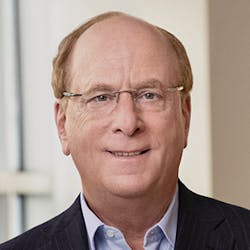Larry Fink might still believe that in May 2023, but he also now acknowledges that the long-term journey gets tougher and tougher during these highly challenging times of inflation, interest rate hikes and, most forebodingly, global military and political conflict.
The enormous expense required in cutting global greenhouse gas emissions to Net Zero by 2050 could $100 trillion or more, according to various estimates such as the International Energy Agency and Forbes. And yet achieving that goal must include invention of new technologies to both make it cheaper and help emerging, poorer markets along for the ride, the BlackRock leader said in a recent chat with the Global Energy Summit at Columbia University.
And right now the financial mechanisms to do that are not completely in place. It might even take a restructuring of the way international banks operate to make it happen. It certainly will take gigatons of cooperation and coordination.
“We’re really not being truthful to ourselves,” Fink said in the recorded chat with Jason Bordoff, founding director at the Center for Global Energy Policy at Columbia's School of International and Public Affairs. The full interview was released an accessible via a LinkedIn post.
First of all, skeptics say, where is this $100 trillion and more going to come from and how will it ensure a return on investment? And even if that capital is deployed efficiently in developed economies, what about the rest of the world where the need for affordable electricity is even greater and the means are harder to come by.
In other words, what good is all of this energy transitioning if China, India, southeast Asia, South America and Africa are still burning fossil fuels because that is the quickest and most affordable way to heat and electrify homes and businesses.
“This is where I’m an alarmist,” Fink admitted. “If we want to be faithful to this (goal) we need emerging countries to come along with us.”
Fink is not alone in pushing back on the past, almost over-confident nature of environmental policy making. Even highly supportive entities to Net Zero 2050 goals are warning that “show me the money” is no more important than “how much is this going to cost me?”
“Affordability is No. 1 on their minds,” Duke Energy’s Retha Hunsicker, vice president of that utility’s customer experience design and solutions team, said during a panel session with other utility leaders at the always decarbonization-friendly Accenture International Utilities and Energy Conference last month in Los Angeles.
“We’ve got to bring customers along this evolution with us,” she said. “We need to make sure it’s customer-centered information and to bring employees along, too. We don’t want to leave them behind.”
A recent JD Power survey seemed to prove this point, as a rising number of U.S. respondents said they wouldn't even consider buying an electric vehicle. Twenty-one percent affirmed their full-bore resistance to e-mobility pushes due to fears about cost, range and time to charge, among other things.
Nor can we desert the emerging world, either, BlackRock’s Fink noted in his Columbia University chat. Fink runs a global private equity giant with close to $9 trillion under management for the benefit of pension funds and retirement accounts nearly everywhere.
And BlackRock has invested big in energy transition technologies for years. So he knows a thing or two about how the financial world works, and yet he’s not seeing a viable fiscal plan forward for comprehensive global energy transition funding.
“No one has come up with a proper solution on how we bring the emerging world forward,” Fink said. “The only way is to create better technology to bring down the cost.”
Energy transition advocates are thrilled in the U.S. after the Biden Administration pushed through financing and incentive-friendly legislation such as the Infrastructure and Inflation Reduction Acts. However, nationally significant elections come around every two years and America has been known to tack suddenly right or left almost as quickly as the Nino-Nina weather phases.
At the same time, inflation accelerated by a variety of factors from tighter supply chains and more than a decade of nearly zero interest rates is not going to drop to pre-pandemic levels anytime soon, he contended. In fact, the recent move to bring more energy transition and industrial manufacturing back to the U.S. could likely result in sustained higher prices than in the old, not so long ago days of unfettered globalism.
That inflation, in turn, will keep the Federal Reserve’s hand steady on maintaining higher interest rates. And more expensive lending, of course, can lead to tighter credit conditions for investment.
The customer in the energy sector may want clean energy but he or she also wants abundant, cheaper energy maybe even more.
And we cannot just wish away the bad old hydrocarbons. They are a bridge at the very least, and highly favored among a sizable part of the population which doesn't align with energy transition orthodoxy.
“We need to have a conversation and we need to be thoughtful about it,” Fink said. “We need to find ways of working together instead of talking around each other and over each other. I’m an optimist on decarbonization, but before that we need to make sure we include (resource) adequacy in energy policy.”
The U.S. federal policy is currently leaning to the left federally with a Democratic president, but that could change in less than two years, just as the nation had voted all Republican in 2016. Across the land, meanwhile, is a patchwork of red state and blue state attitudes and policies.
Fink said the work of BlackRock is to remain a dutiful fiduciary to his clients, whatever their goals and leanings are. He and BlackRock have experienced some blowback from states, such as Texas and West Virginia, where oil, gas and coal are still highly valued and historic employers.
“I can’t impose my views” when investing other people’s money, Fink pointed out. His opinion is clearly that investing in decarbonization is a wise, long-term move that will produce good returns, yet the investor and field of operation plays the leading role in those decisions.
“Each and every client has a right to determine how their money is put to work,” Fink told the Columbia University forum crowd. “Some people have forgotten that.
“Some states say you can’t factor in ESG or decarbonization with our money, while others say you have to factor that into everything you do,” the BlackRock founder noted. “We have to follow what their wishes are.”






